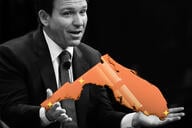You have /5 articles left.
Sign up for a free account or log in.
With broad adoption of rented textbooks and the steady but incremental shift from print to digital, the price of instructional materials is inching down -- far too slowly for those worried about students' costs, but enough to have significantly hurt the bottom line of most campus bookstores.
And the continuation of that trend is certain enough that it is only a matter of time before college stores, which now typically derive about 60 percent of their revenue from textbooks and other instructional material, will die if they do not change to "be financially self-supporting without making textbooks a profit center," says Robert Walton, CEO of the National Association of College Stores.
Many colleges and universities have responded to those trends and the increasing complexity of the bookstore landscape by leasing the operations of their campus stores to outside providers like Barnes & Noble and Follett; the number of independent bookstores, which now stands at about 1,550, shrinks by about 7 to 10 percent a year.
Walton thinks that's bad for higher education (and ultimately students) because of the hundreds of millions of dollars the institutions pay to the bookstore operators. On Saturday, his organization announced a new effort to give colleges more tools for keeping their bookstores independent -- and to make it more feasible for them to hold on to the money they now pay to the lease operations, "about $1 billion that used to go into higher ed every five years," Walton says.
"We're expecting a bare-knuckle fight with Follett and Barnes & Noble."
At the Campus Market Expo in Salt Lake City, NACS, which has historically been more of a trade association, announced the launch of IndiCo, a collaborative involving independent stores, digital textbook providers, virtual bookstores and other partners -- including the 800-lb. gorilla in the textbook market, Amazon.
IndiCo, which stands for Independent Campus Stores Collaborative, will offer a suite of services that run from operating entire campus stores to filling gaps that independent stores have, for instance in discovering and providing affordable course materials, improving their marketing and website presences, or refreshing their store design. A video explaining its services can be found here.
Walton compares the new entity to United Educators, which provides liability insurance and risk management services to 1,300 members (Walton worked with United Educators when he was a chief financial officer at Vassar and the Claremont Colleges). In short, the new organization hopes to give campus stores an alternative to using Follett and Barnes & Noble -- not only in allowing more of the 1,500-odd existing independent stores to stay independent, but to encourage some of those who lease to become independent again.
And Walton doesn't shy away from taking on the leasing behemoths head-on, and using fighting words.
"We're expecting a bare-knuckle fight with Follett and Barnes & Noble," he says. "If a university goes out to bid to run its store, we're going to respond just like a commercial supplier would. We're going to try to push Follett and Barnes & Noble back, with the goal of keeping more of the money with the institutions."
IndiCo's partners will include VitalSource/Verba and RedShelf, which will help bookstores and their students identify, buy, sample and track the use of ebooks and other digital instructional material; Sidewalk, for book rentals and tracking faculty adoptions; Akadémos, a virtual textbook provider and student marketplace for those stores that want to stop providing those services; and Amazon, which will provide books at wholesale prices to IndiCo's members, which Walton says the retail giant has not done before. Other partners include Montezuma Publishing, Nebraska Book Company and Trimdata Corp.
Walton's vision is that IndiCo and its corporate partners will enable independent campus stores to offer the lowest possible prices on instructional materials to students. While that will arguably hasten the pace at which the stores must wean themselves from relying on textbook revenue (and profits), the collaborative is also designed to increase their buying power so they can buy the other merchandise they sell to students and alumni more cheaply, and therefore increase their margins and profitability on noninstructional materials. (The association expects down the road to formally announce a plan to help its stores buy merchandise directly from Asia.)
The expectation, Walton says, is that these changes will allow campus stores to focus less on pure retail and more on education. In this vision, the bookstore becomes an "academic resource, creating stronger partnerships with faculty and alignment to student learning outcomes," IndiCo says in promotional materials.
Barnes & Noble officials declined to comment for this article. Clay Wahl, executive vice president for sales operations at Follett Higher Education, said via email that the company "applauds Indico’s intent to play a role in sustaining the relevancy of higher education bookstores, which has been the core mission of Follett Corporation for over 80 years."
He said that in addition to managing stores through leasing arrangements, Follett provides a range of services to independent campus stores and works to "address textbook affordability with our text rental library, the nation’s largest," used books, digital and OER content and integration, and other approaches.
"These services integrate within the existing technology platforms of our customers; they are not standalone services provided by multiple companies," Wahl said. "Follett has invested heavily in these academic integration points, technologies and tools to truly reduce the level of complexity for administrators, faculty and students."
He added: "Every physical or virtual store requires expense to operate, whether it’s Follett or the institution that runs its own bookstore. This is why Follett has had decades of success operating bookstores for institutions that prefer to focus on education. Because of Follett’s resources and our many years of experience in managing bookstores, we provide efficient operations that allow us to return a portion of store profit to the institution for reinvestment within the campus community."
Optimism From Partners
Some of the entities IndiCo will be working with say they believe the collaborative is an idea whose time has come.
"From the conversations we've had, I think this can have a significant impact as an alternative option for institutions," says Jonathan Shar, chief marketing officer for Akadémos. "There's a lot of interest from schools in finding alternative solutions to really address textbook affordability, but many of them no longer have the knowledge and resources to run a general merchandise store themselves. This seems like it has the possibility of creating a one-stop shop hybrid solution for those institutions that want to move off lease, to take back the campus store."
Mike Hale, VitalSource's vice president of education for North America, said IndiCo can "make it easier for stores to handle a more complex marketplace."
Helping independent stores navigate the many choices they have to make about instructional materials and increasing their buying power through the consortium, he said, will help "make stores more relevant to the mission of their universities."





